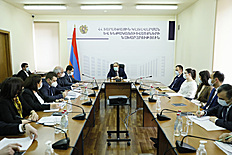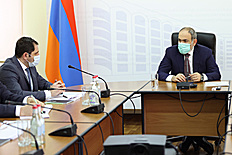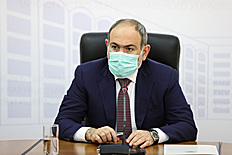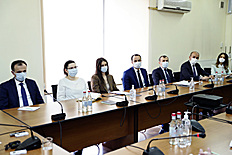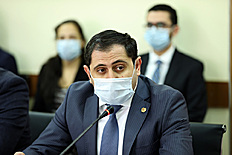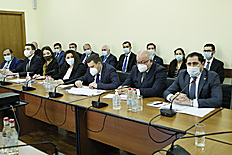Press releases
“Subvention programs are the most effective tool on way to ensuring harmonious territorial development” - PM reviews Ministry of Territorial Administration and Infrastructure-implemented programs
more 3 photos
Prime Minister Nikol Pashinyan visited the Ministry of Territorial Administration and Infrastructure (MTAI) to discuss the Ministry’s ongoing and upcoming programs. The meeting was attended by Chief of the Staff of the Prime Minister Arsen Torosyan, Minister of Territorial Administration and Infrastructure Suren Papikyan, the deputy ministers, the heads of MTAI-affiliated agencies and other government officials.
Prime Minister Pashinyan first touched on the activities carried out by the Ministry, noting: “The bulk of capital expenditures is carried out through the Ministry of Territorial Administration and Infrastructure. Note that this is an area of primary importance. I would like to highlight those subvention programs implemented in cooperation with communities. In this context, I wish to state subvention programs are the most effective tool for ensuring harmonious territorial development. Today we will discuss issues related to infrastructure, including what we have achieved in the field of energy and natural resources, the emerging problems in order to decide on the steps to take ahead.”
Minister of Territorial Administration and Infrastructure Suren Papikyan reported on the work carried out as part of per-sector activities. 580 programs were implemented in 2020 to a total cost of 26.2 billion drams, with government’s share amounting to 14.3 billion drams. A total of 1192 subvention programs were implemented in 2018-2020 to the amount of 47.5 billion drams, of which 25.5 billion drams came from the state budget, 21.5 billion drams - co-financed by local communities, and 500 million drams contributed by individual investors. 368 out of said 1,192 programs sought to improve 270 km of intra-community streets, 134 - water supply networks, 78 - construction of irrigation systems, and 161 programs - street lighting, etc. There are 800 subvention bids submitted for 2021, which are under consideration at this point of time.
The Minister described the subvention programs as quite effective, stressing that the government’s involvement makes it possible to monitor the costs and the quality of construction. In the field of road construction, 350 km of roads were repaired in 2019, about 400 km of roads were repaired in 2020; 150 km of intra-community roads were repaired within the framework of subvention programs. There are several sources of funding: from the state budget to grants and loan programs.
The Lifeline Roads Improvement Program and the construction of the M6 highway (Vanadzor-Bagratashen) were carried out in 2020 and continue to be implemented this year. The construction of the 42-50 km-long Talin-Lanjik and Landjik-Gyumri road sections will start in 2020 under the North-South Project. In the field of road transport, all routes have been developed and mapped as part of the program of developing a unified route network in the Republic of Armenia. Early this month a tender to this end was announced in Armavir Marz, the results of which will be summarized in mid-April. If successful, similar tenders will be held in other regions as well to address the transport communication problems.
In the field of energy, the construction of a 250 MW TPP will be completed by this yearend. The Masrik-1 solar power plant project with a capacity of 55 MW will continue this year. On February 1, 2021, the wholesale electricity market management program was tested. Efforts are underway to extend the lifetime of the Armenian NPP: 65 million U.S. dollars have already been invested, with some USD 100 million to be invested in 2021-2023.
The construction of the Iran-Armenia transmission line and the Noravan substation continued, with 27 million euros invested. In terms of funding, as much work was done in 2019-2020 as in 2006-2019 altogether.
The Caucasus transmission line program was restarted, at a cost of 188 million euros. The reconstruction of Hakhtanak and Ashnak substations and the construction of the new Lalvar-Noyemberyan overhead transmission line were completed with an investment of 28 million dollars. Vanadzor 1, Charentsavan, Lichk, Agarak and Shinuair substations are in process of reconstruction.
Coming to infrastructure programs, the Minister singled out the urban road network rehabilitation program in Gyumri. 9 streets to a total length of 12 km and 2 public squares have already been completed under the aforementioned program. 23 more streets to an aggregate length of 11 km will be repaired in the near future. As a result, a total of 25 streets are due to be rehabilitated, which will have a positive impact on the disaster zone in terms of revitalizing public infrastructure in Gyumri.
As part of programs implemented by the Territorial Development Fund, Minister Papikyan touched upon the modernization of irrigation systems, which started in 2020 and will continue this year. 37.4 km of mechanical and 265.9 km of intra-community irrigation networks will be reconstructed, which will help substitute the obsolete irrigation systems in Kotayk, Aragatsotn, Armavir and Ararat Marzes of Armenia. Construction of the Vedi Reservoir is underway; the Kaps Reservoir project is starting this year.
The importance of the Seismic Safety Enhancement Program was also emphasized, under which at least 46 schools will be built / strengthened in the period under review. Since the beginning of the program, 19 schools have entered the active phase of construction. Construction of 6 schools has been completed, construction of 2 will be completed in 2021, and construction of 11 in 2022. Currently, 15 school buildings are being designed, 11 of which have been completed and are at various stages of examination.
In the field of garbage disposal, construction of the Kotajk-Gegarkunik landfill started in December 2020 (worth 11 million euros). It will be continued as soon as the weather conditions improve. The landfill will be commissioned within a year.
The community consolidation process continues in the field of local self-government; it will be complete in 2022. 54 communities have already been merged; public service offices have been established in those 54 communities in cooperation with international partners. Nineteen more will be established between 2021 and 2022. A unified electronic system of registration and collection of property tax, property tax and vehicle tax is launched in January 2021.
In the sphere of migration policy, 183 families displaced from Azerbaijan in 1988-1992 in urgent need of housing received certificates for the purchase of housing to the amount of 2.4 billion drams. The beneficiaries have signed 64 sales contracts, based on which the money transfers were made. This process will continue this year. It will be completed in Yerevan, then in the provinces.
In the sphere of subsoil use, the Law on Subsoil was adopted in 2020. The law introduced tangible changes in the given sphere which, according to the Minister, is important but not enough, considering that the process of legislative reforms will be lengthy. The amount of arrears accumulated by subsoil users to the state budget was 857,675,775 drams in 2018-2021. A number of companies were stripped of their licenses due to improper compliance with the obligations. A system of declaring real owners has been developed, and a procedure of subsoil expertise has been introduced.
The meeting went on to discuss issues related to current problems and the steps to take ahead. The deputy ministers, the heads of subordinate structures presented explanations to the Prime Minister, came up with proposals on improving the planned activities.
The Prime Minister stressed that it is necessary to set the task of raising and improving standards in the field of territorial development and infrastructure and move in this direction. Nikol Pashinyan stressed the importance of harmonizing all existing road construction programs in terms of both construction work and financing mechanisms in order to carry out this process in a complete and complementary manner. With reference to the mining industry, the Premier made a point of enforcing the practice of responsible use of national resources and the continued improvement of existing systems.
Prime Minister Pashinyan emphasized that the development of infrastructure is a priority for his government, and this target should be met through funds attracted from a variety of financial sources: state, community, banks and private investors.
In conclusion, an arrangement was made to continue discussions in a working format with a focus on aviation, migration and other spheres.
